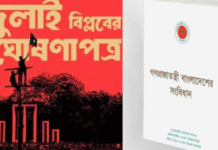Has there ever been a time when politicians (or their equivalent in prehistoric times) could be trusted, taken on their words? I do not know the answer. What we notice across the globe, at least where the convention of holding elections prevails, politicians try their best to persuade voters that they are harbingers of comfort and prosperity, and that they are way better than their competitors. Their hearts and souls — every imagination, thought, consideration, action — are (or will be if not in government) immensely dedicated to the betterment of the population which they are vying to serve. And of course not only are we to believe them, but also to realise the obvious — that their opposition is the reason for all that has gone bad so far — that they have the magical power to fix things.
Various platitudes on this theme are utilised, from time to time, to account for diversity oozing out of the age, race, religion, culture, geography, history or technological advancement of the target audience. The pitch is inevitably tailored to suit the time and location. Yet, the method remains universal and has withstood the test of time.

The winning party in the recent Australian election is yet to have a chance to call on the new Parliament (and hence its MPs) to debate issues, specially those on which they campaigned so hard such as ‘Stop The Boats’, ‘Reduce The Waste’ or ‘Reign In A Reckless Spending Spree’ that the previous party was brutally exposed to, only a few months ago. The losing party struggled to counter key issues (which is why they lost) to convince the voters: for example, that in a time of global economic downturn being experienced by developed economies, with limited (tax) revenue governments are left with few options other than to borrow more and to look for ways to increase income — usually through taxes such as a mining tax or a carbon tax (which was introduced after quarrels only a year ago and caused a few casualties in politics here).
As the incoming government (then the opposition) has now approved a near double (from $300 billion to $500 billion) increase to Australia’s debt limit, its pre-election gung-ho proves to be a red herring. No doubt persuasive arguments will be put forward, including blaming its predecessor for the sorry deed; time will pass and by the next election these may not even be remembered as issues.
In coming months, it would be fair to expect more policy reversals from the government. This is neither a first nor will it be the last time a political party reneged on something — I am certain all of you will be able to come up with at least one such distinct example.

The question is, when our hands are tied to politicians, how best to deal with their oratory? A suitable answer cannot be more useful for us now, given the ongoing discourse between our leaders, whose longevity would make politicians elsewhere jealous, about the arrangement for holding the next election.
This is the fourth duel between them in about 20 odd years. Though similar impasse polluted pre-election atmosphere in the last three times, the way out varied. Naturally, it is very difficult to predict the likely unfolding of coming events.
Following some rather contrived events which took innocent lives and hampered daily living throughout the year, to gain an upper hand in the coming election, we have finally arrived at the climax.
Both leaders had their opening salvos in the preceding week as commentators are unleashing arrays of possibilities and intrigues, some with highly plausible scenarios identifying likely moves by the key players — Western powers, India, China and so on. As an example, India’s interests are commonly deemed as no support to its dissidents in the North-Eastern states of Assam and Nagaland, protection of Hindu minorities, but above all ensuring that no significant inroads by China are made.
Yet, even if these persuasive possibilities are true, what other underlying issues are being overlooked? In spite of surging popularity for both parties’ strategic moves — the trial of the war criminals and the demand for an election under a neutral caretaker government — from the nation’s perspective, could hardly be mutually exclusive demands.
If both leaders, as they usually claim, have been putting the nation first how do we get tangled up in dire emergencies and harmful unrest? At the time of writing this, the ‘phone conversation’ between the leaders has come out providing the basis of their grievances.
This, while no doubt will be subject to many more opinion pieces and will be referenced in discussions in years to come, initial reactions signal a premature death to a potential compromise between the two leaders. Notwithstanding, pleas for a dialogue between the two are still urged earnestly as hartal claims more lives, disrupting ordinary living yet again.
Eerily, the contest between them has always been lively but lengthy. Would the present tussle be any different? Depends on an absolute unknown — the leaders’ (and of course their aides’) intentions. Party hacks are doing their bits to keep the support base intact and reassure that their leader’s ploys are indeed defendable and the only sensible steps left to adapt to the circumstances. Trusting their arguments, violent strikes as well as an unyielding aim to hold an election under a partisan executive can easily be justified.
But long suffering citizens, I think, have learned not to take anything that is said on its face value.
Source: Bd news24









